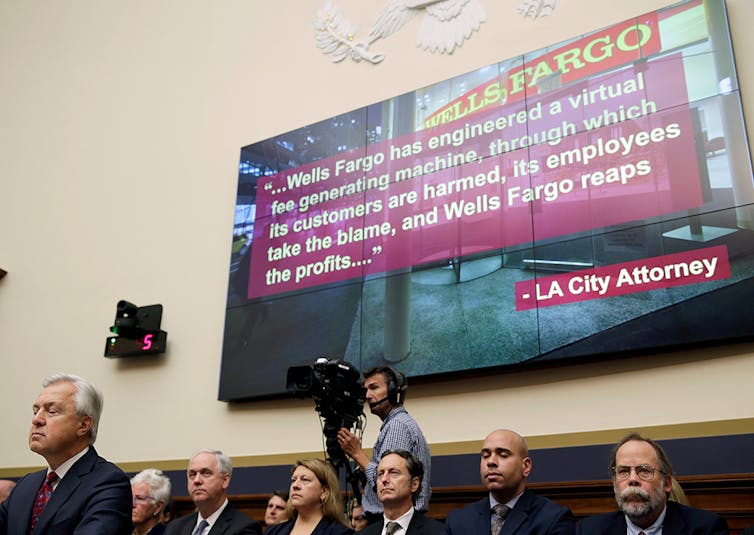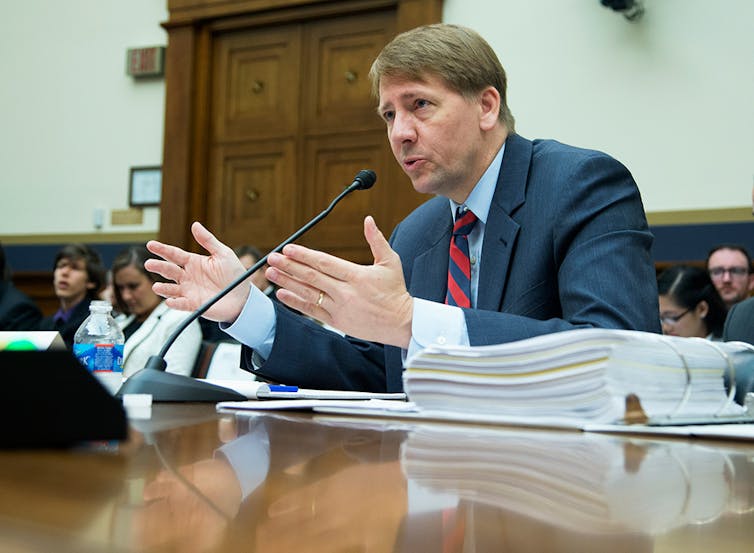the consumer financial protection bureau was originally designed to do what?
Republicans in Congress and the White House have been very blunt nearly their desire to gut the Consumer Financial Protection Bureau – and the threats to it are mounting.
The agency was launched in 2011 in the backwash of the financial crisis every bit part of the Dodd-Frank Wall Street Reform and Consumer Protection Deed. The goal was to protect consumers from deceptive or misleading practices in the financial manufacture.
At the moment, Republicans seem focused on blocking CFPB rules they don't like, such every bit one that would have prevented the utilise of mediation clauses in financial contracts, making it easier for people to ring together to sue banks for wrongdoing. Separately, the Trump administration has been heavily critical of the CFPB, and its director is said to exist considering leaving before his term expires side by side July, which would allow the president to choice his replacement.
So what would you miss if the agency suddenly disappeared or got gutted?
In brusque, a lot. We base of operations this decision on the work the 3 of u.s. have done in recent decades. One of united states (Sovern) has been writing almost consumer law for more than than thirty years, while the other ii of us direct a legal dispensary that represents elderly consumers. We've seen the worst of what fiscal companies can do, and we've also witnessed how the CFPB has begun to contrary the tide.

Life before CFPB
If yous are ane of the more than than 29 million consumers who take collectively received near US$12 billion back from misbehaving financial institutions because of the CFPB's efforts, you already know its value. Only even if you lot are not, you lot take probably benefited from the bureau's existence.
Before Congress created the agency, there was no federal agency that made consumer fiscal protection its sole mission. Rather, consumer protection was rolled into the missions of a bunch of dissimilar agencies. And, equally we saw during the financial crunch, regulators oft gave it a back seat.
Congress, for case, gave the Federal Reserve the power to bar unfair and deceptive mortgage lending in 1994. Yet the central banking company considered consumer protection a backwater and didn't utilize that ability until 2008 – likewise late to prevent the Great Recession. Congress took it away two years later when information technology passed Dodd-Frank.
The Office of the Comptroller of the Currency regulates banks but was so preoccupied with ensuring lenders were prophylactic that information technology failed to protect consumers from their predatory subprime mortgages – and then much so that it prevented states from doing so likewise. And now President Trump has put a former bank lawyer in accuse of it. The Federal Trade Commission, which is tasked with fighting deceptive concern practices, lacked the power to forbid such dangerous lending.
This meant consumer protection on financial matters fell through the cracks.
Wells Fargo's recent fraud scandal is a case in point. In the early 2000s, Wells Fargo employees began opening fake accounts in clients' names without permission, leading in some cases to lower credit scores and a diverseness of fees. The bank ultimately opened millions of fraudulent bank and credit card accounts before the scheme came to an end concluding year.
But as early on as 2010, before the CFPB was set up, regulators at the OCC were increasingly aware of what was happening at Wells Fargo thank you to hundreds of whistleblower complaints. The OCC fifty-fifty confronted the bank, yet failed to take any action despite many scarlet flags, according to an internal inspect.
Information technology wasn't until the Los Angeles city attorney and the CFPB became involved years later that Wells Fargo took forceful action to stop the fraud. The regulators fined Wells Fargo a full of $185 1000000 and forced it to refund fees it had charged customers and hire an independent consultant to review its procedures.
More than importantly, they sent a clear message to other financial institutions: Cheat consumers and you will face up the consequences.

Protecting consumers
Since its inception, the bureau has acted repeatedly to end financial institutions from harming consumers.
It blocked debt collector attorneys from suing consumers based on false data. It discovered systemic problems with consumer credit reports and forced companies to correct errors. Information technology compelled credit card companies to refund illegal fees. It protected borrowers from unlawful educatee loan servicing practices. It made lenders repay consumers they discriminated against. It recovered money for veterans who complained of calumniating fiscal practices.
When the agency began publishing consumer complaints on its website, companies that might previously take ignored negative feedback paid attention. Financial institutions accept responded to complaints to the CFPB more than 700,000 times, oft by providing a remedy to the consumers.
Besides protecting consumers, however, Congress had a 2nd motive in creating the agency: to aid prevent the kind of mortgage lending that helped cause the Great Recession.
To that stop, the bureau has adopted rules that assist consumers to understand their mortgages – something that oftentimes wasn't possible nether the previously misleading mortgage disclosures. It as well issued regulations to prevent consumers from taking out mortgages that they couldn't repay. And after borrowers take out a mortgage, CFPB servicing rules establish the procedures servicers must follow when communicating with borrowers, correcting errors, providing information and dealing with loan modification requests.
2 of us have personal experience with one of the agency'due south new mortgage rules, which powerfully illustrates the value of the CFPB.
In 2014, Alice, a customer of our constabulary school clinic, was struggling to pay the mortgage on her home – which she had refinanced a few years before – afterward a stroke forced her into retirement. Our dispensary helped her apply for a modification of her loan.
Merely within weeks, instead of acknowledging Alice's application, the loan servicer summoned her to court to begin foreclosure proceedings in violation of CFPB servicing rules. Fortunately, our clinic was able to rely on those rules in getting the foreclosure action dismissed. Alice got her loan modified and remains in her home.

Protecting the vulnerable
This reveals how the bureau is particularly important to protect vulnerable consumers, like the elderly, who are frequently targeted by fraudsters and predatory lenders because of their cerebral and other impairments and because they often take accumulated substantial avails. The CFPB is the only federal bureau with an office specifically defended to protecting the financial well-existence of older adults.
The bureau has brought cases against companies that attempted to have advantage of seniors by, for example, misrepresenting the interest rates on pension advance loans or deceptive advertisement. In 2015 alone, consumer complaints to the CFPB brought relief to more 600 older Americans just through debt collection problems.
The bureau has as well worked to prevent financial corruption of the elderly, estimated to cost seniors as much as $36 billion annually. The CFPB has educated fiscal institutions, nursing facilities and others about recognizing and stopping elder financial abuse and exploitation.
Consumer protection in peril
Given Alice'south sick wellness, the consequences for her might have been disastrous if she had been thrown out of her dwelling. Merely now she – and all of united states of america – face the loss of the CFPB's aid.
The CFPB is under set on from Republican members of Congress who believe more in lifting bank regulations than in protecting consumers. Some members have proposed eliminating the bureau altogether.
The Business firm of Representatives has passed a bill that would cripple the CFPB past, for example, taking away the ability it used to fine Wells Fargo for opening illegal accounts and concealing its complaint database from public view. In other words, it would force the agency to sit idly by equally financial institutions lie to consumers. Even if the bureau survives, it may exist less protective of consumers when its current director, Richard Cordray, leaves. His term expires adjacent summertime, and he may step downwards fifty-fifty sooner. Then we might see a sometime banker or bank lawyer put in charge, just as has happened at the Treasury Department and comptroller's role.
Near every American has or will take a loan or banking concern business relationship, a prepaid carte du jour, credit carte, a credit study or some combination of those, and so has dealings with a fiscal institution policed by the CFPB. Only few of us read the fine impress governing these things or can empathize information technology when we do. That gives the companies that write these agreements the ability to typhoon them to suit their own interests at the expense of consumers.
Similarly, nosotros do not always know when a financial institution takes advantage of us, but every bit Wells Fargo customers did non e'er know that it had opened unauthorized accounts that lowered their credit scores.
Consumers demand protection from misbehaving companies. If the agency is eliminated, significantly weakened or starts protecting banks rather than consumers, all consumers will endure.
This is an updated version of an article originally published on July ten, 2017.
Source: https://theconversation.com/why-we-need-to-save-the-consumer-financial-protection-bureau-86379
0 Response to "the consumer financial protection bureau was originally designed to do what?"
Post a Comment